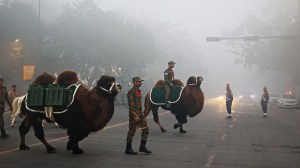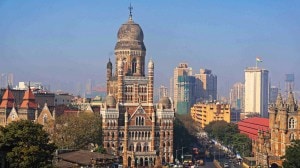The Pilot Perfect
Watching planes flying above his Pune house, the three-year-old boy added another ambition to his dream list. To fly a plane. Earlier, li...

Watching planes flying above his Pune house, the three-year-old boy added another ambition to his dream list. To fly a plane. Earlier, like most boys his age, he wanted to be a train engine-driver. But then as he grew up, his father, an Army officer, moved to Delhi, he began cycling all the way to Palam airport to watch the planes take off, make loops in the air.
So it was only natural that when he was 15, he would go to the National Defence Academy. It ran in the family too: his elder brothers had chosen the Army and Navy, he had the Air Force. And 38 years later, the top job.
On December 31, when Air Chief Marshal Anil Yashwant Tipnis took charge amid the usual pomp and ceremony, the spotlights were turned elsewhere. Newspaper front pages and television screens featured the sacked Navy Chief Admiral Vishnu Bhagwat.
For Tipnis, all this was just another coincidence.
Though an 8220;average student8221; all through his years at the National Defence Academy NDA, he was a 8220;natural8221; in air 8212; initiallywith the hand-gliders and then with almost every aircraft in the IAF inventory.
Judged the best pilot on more than one occasion, awards and trophies followed Tipnis 8212; the Mazumdar trophy for flying at the Jet Training Wing, the Narona trophy on graduating as a Pilot Attack Instructor and the sword of honour for being the best fighter combat leader. Commissioned in 1960 as a fighter pilot, the six-ft tall 20-year-old was still a Cheeko with no facial hair.
When MiG-21s were brought in, the best pilots from the Gnat and Hunter squadrons were roped in to go to Chandigarh. Young Tippy too was bundled off. 8220;I did not want to go. I was happy at Ambala. Because I reached a day late Air Chief Marshal Dilbagh Singh then a young wing commander was fuming. I told him I was not keen to join the MiG squadron. He said okay, go back. But by then I had seen the MiGs. They were good. And I said, Sir now that I have seen the planes, I would like to stay on8217;,8221; Tipnis said.
Tippy became the best student, everwilling to learn. And the quality stays. Even today as he flies the state-of-the-art Sukhois or the Mirage-2000s or the MiG-29s, he is willing to learn a thing or two from the young pilots and offer a word of advice to them. Advice based on experience of sweating out in peace to avoid bleeding during war.
It was during war that Tipnis got married. Kuchch was where trouble erupted in 1965. He was put on alert. He flew to Mumbai on May 11, got married on May 12, went to Lonavala on May 13 for a one-day honeymoon and was back in Chandigarh on May 14. He says his brother, a Navy officer, had it better. He flew from INS Vikrant to Mumbai, got married the same day and flew back. His aircraft had a small board hung in the rear that said: Just married.8217;
But life has not been a bed of roses for Tipnis. His wife was down with kidney ailment. Tipnis sought advice from the best doctors, spent all his meagre savings, even withdrew his provident fund, shuttled between hospitals. He took her to the erstwhile USSR fortreatment, first on leave, then on leave without pay, finally he ran out of leave so the IAF posted him in Moscow. But within 15 days, his wife died.
He brought up his three daughters, his eldest daughter donned the mantle of Mother to the other two. Tipnis went on to become a good pilot, a better administrator and a still better father. When he was sent to France on the Mirage 2000 project, his eldest daughter decided to get married and settle in the United Kingdom. That was when Tipnis felt a little inadequate 8212; on not being able to advise a young girl on her marriage.
He returned home and took over as the Air Officer Commanding in Gwalior. He was the top man at the air base without the first lady. And it was where he met Molina, who had lost her Army officer husband. She had 11-year-old son. They decided to get married and soon the air base got a first lady.
Tragedies came back to haunt the Tipnis family. The boy died of fever.
8220;Any other man would have collapsed. But Tippy is a complete man,8221;says a friend of his. True, it was more than what anyone could bear. 8220;Both of us realised that life does not pity anybody. Nature8217;s ways are like that. She told me that we had to count our blessings. The pain remains,8221; Tipnis says.
But there was more pain to follow. Their daughter lost her husband soon in a car accident in the US. Both Tipnis and Molina think the armed forces came to them as a family in their hours of grief.
While he battled pain in his personal life, Tipnis was considered to be outstandingly lucky in his public life. He had done stints abroad, completed his National Defence College course was posted as Air Officer Commanding and became the Vice Chief of Air Staff.
His colleagues say that the sufferings in life has never affected Tipnis the officer. He leads by example. If there is a new aircraft Tipnis has to fly it first. He says he never wants young officers to say, 8220;You old hog, technology in your times was different.8221; There are more lessons for his junior officers to learn fromhim: to keep fit, he climbs up 5 flights of stairs to reach his office at Air Headquarters everyday.
Though a perfectionist, the CAS is not a hard taskmaster. 8220;Somebody could smile at me and get away with murder,8221; he says.
Tipnis himself feels he is very lucky. And why not? He was planning to play golf all day after retirement just three months ago when the government increased the age limit to 60 years and appointed him the Chief of Air Staff.
- 01
- 02
- 03
- 04
- 05































